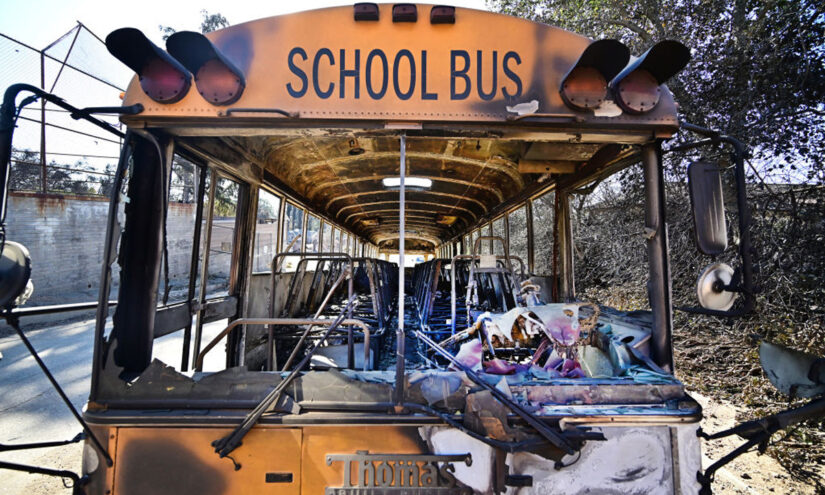Brianne Dolney-Jacobs has spent the last year advising high school seniors in Bay City, Mich., on their options after graduation.
She met with 96 percent of the seniors at least once to talk about college applications, financial aid options, standardized tests and more. In doing so, she helped nearly 30 students access a countywide scholarship, up from under 10 in the previous year.
But now, she’s one of 32,000 people affected by sweeping cuts to AmeriCorps, a federal agency focused on service and volunteerism across the United States. At least 100 college-access groups, including the Michigan College Access Network, where Dolney-Jacobs works, rely on AmeriCorps funding or members to make the college application process more accessible to high school students, especially those in low-income areas and at schools with low rates of college attendance.
MCAN lost its grant funding this week and was ordered to cease all AmeriCorps work immediately, though the organization was able to use its own funds to buy staff members an extra month. Dolney-Jacobs will now wrap up her time at the high school at the end of May; she was supposed to stay on through late June.
Without someone in her position, Dolney-Jacobs told Inside Higher Ed, there is no one at her school who would have the bandwidth to meet with individual students as they navigate the college application process. Many students would never have heard about different scholarships that are available to them or know that community college—including both an associate’s degree and some trade certifications—is free for recent high school graduates in Michigan.
When her students heard that her position had been impacted, a group brought flowers to her office.
“They told me, ‘you are the Class of 2025’s hero,’” she recounted. “And I was just bawling.”
The National College Attainment Network, the association for MCAN and other similar organizations, is still taking stock of how many of its members have been impacted, said Elizabeth Morgan, NCAN’s chief external relations officer. But damage has been widespread.
“I think it’s safe to say probably our members that use AmeriCorps are serving hundreds of thousands of students across the country,” Morgan said. “They are devastated by this news for a couple of reasons: The students they are supporting right now, many are high school seniors who are just weeding through their [college] decision-making process … [and] the AmeriCorps members are being thrown out of work months early.”
A total of $400 million in AmeriCorps grants were axed, according to America’s Service Commission, a nonprofit that represents state and national service commissions, including funding for food pantries and disaster relief programs in areas impacted by recent natural disasters. The majority of AmeriCorps’ staff was also put on administrative leave in mid-April.
It’s just one of the many agencies that have faced funding cuts and grant cancellations as part of the Trump administration’s war on government spending. Its defenders say that the agency, which pays modest stipends to its members, is anything but wasteful: It provides both vital supports for American communities and professional development training to its members, all for a low price tag.
“I don’t believe Washington is really in tune to what is going on in the local communities,” said Grady Holmes, who works with a different MCAN AmeriCorps program that provides college success coaching to community college and tribal college students. “This is a program that is not government waste. It basically assists the government in making sure their productive citizens are being moved toward self-sufficiency and obtaining a college degree … When the powers that be decided this is wasteful spending—they don’t understand AmeriCorps.”
Twenty-four states sued the Trump administration over the cuts, calling the dismantling of the agency, which was created by Congress in 1993, “unauthorized.”
Advisers’ Impacts
MCAN is facing cuts to two student-facing programs: AdviseMI, which is focused on college readiness for high schoolers, and the College Completion Corps, which is geared toward students at tribal and community colleges. Both rely on AmeriCorps grants and are staffed by AmeriCorps members, who work in yearlong service positions in exchange for stipends and educational awards that can cover current educational expenses or pay off student loans. The organization employs over 100 AmeriCorps members across both programs.
Both programs have been successful, MCAN leaders say. In the 2023–24 academic year, students supported by AdviseMI advisers submitted 21,420 college applications and were awarded more than $32 million in financial aid.
The advisers “often interact with parents, as well, to help parents understand the role of FAFSA and help parents understand what’s happening with their student,” said Ryan Fewins-Bliss, the organization’s executive director. “And [they] engage the school in what we hope to be a schoolwide college-going culture … so when the juniors become seniors, they’re ready for this.”
After MCAN learned Friday night that it lost one of its AmeriCorps grants, the organization spent the weekend trying figure out how it could keep its AmeriCorps staff on board if the rest of the grants were also canceled. (In total, MCAN lost $2.1 million in AmeriCorps funds.)
Come Monday, MCAN found out its remaining grants, including funding for AdviseMI and College Completion Corps, were indeed cancelled, and that it had to stop operating those programs immediately. MCAN was able to find funding in the budget to continue those programs for an extra month, but the future beyond then is uncertain.
Other organizations had to lay off their AmeriCorps members entirely. Partnership 4 Kids, a Nebraska-based organization that works with students from prekindergarten through college, had two full-time AmeriCorps fellows working with high school seniors and three fellows working directly with college students. All five had to stop working Friday, immediately after P4K received word that its grants had been terminated.
“These two in the high schools had great relationships with their students. They were doing one-on-one case management; they were the driving force [behind] college applications, scholarship applications, helping students overcome barriers they might have, and really to get them to that finish line to graduate,” P4K president Deb Denbeck said.
This year, 97 percent of P4K’s senior cohort graduated and 80 percent of them are going to college—an impressive feat in a state where the college-going rate for high school graduates has been on the decline.
‘Brings Out the Best in People’
AmeriCorps members have worked in high schools as college advisers for at least two decades, starting with the College Advising Corps, an organization that began in Virginia and has since expanded to 15 states. It’s a model that college-access leaders say has been incredibly effective, helping thousands of students go to college and boosting the careers of the advisers.
It’s also been embraced by politicians on both sides of the aisle, according to Nicole Hurd, who founded the CAC and is now president of Lafayette College.
AmeriCorps members are a natural fit for college-readiness work, these leaders say. Because many are recent college graduates, they can remember what it was like to be in the high schoolers’ shoes, making it easy for them to empathize with and respond to the challenges their students are facing. The college adviser positions are relatively easy to train, meaning individuals from any background can take on these roles.
But perhaps most importantly, leaders of college-access nonprofits feel AmeriCorps’ long-standing ethos of volunteerism aligns perfectly with their missions to bring educational opportunity to all.
“AmeriCorps brings out the best in people, and it gives them an opportunity to learn as well—to learn how to be professionals in their field,” said Denbeck. “When you look at everything that AmeriCorps does, whether it’s working in education or mentoring or agriculture or disaster relief, they’re doing it because of their heart.”
The impacted organizations doubt they’ll be able to rely on AmeriCorps going forward. For now, they’re working to figure out how to continue their work and where they might get the funding necessary to deploy college advisers into the communities that need them most.
“In the future, it’s safe to say that there are countless students that won’t attend college because they’re not getting this kind of support,” Morgan said.










